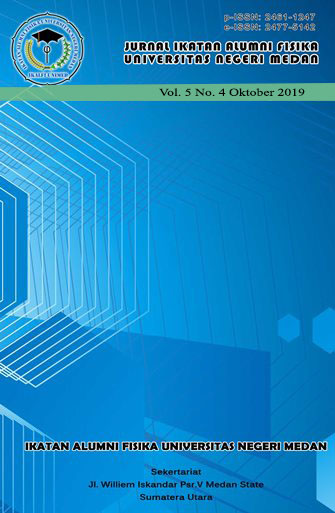Implementasi Model Pembelajaran Inquiry Training Terhadap Hasil Belajar Siswa Di Kelas X SMA
DOI:
https://doi.org/10.24114/jiaf.v5i4.15988Keywords:
aktivitas, hasil belajar, inkuiri trainingAbstract
Penelitian ini menerapkan model pembelajaran inkuiri training, yang bertujuan untuk mengetahui hasil belajar siswa dan aktivitas belajar siswa. Jenis penelitian ini adalah quasi experiment. Populasi dalam penelitian ini seluruh siswa kelas X MIA semester genap SMA N 9 Medan yang terdiri dari empat kelas. Sampel penelitian ditentukan dengan teknik cluster random sampling dan diberikan perlakuan yang berbeda, kelas X MIA 3 sebagai kelas eksperimen dengan model pembelajaran inquiry training dan X MIA 1 sebagai kelas kontrol dengan pembelajaran konvensional. Instrumen yang digunakan adalah tes kemamapuan berpikir kritis yakni tes uraian yang terdiri dari 8 item dan diperoleh hasil postes dengan hasil rata-rata kelas eksperimen 75,6 dan kelas kontrol 70,1. Perbedaan skor rata-rata ini menunjukkan adanya pengaruh model pembelajaran inkuiri training terhadap hasil belajar siswa. Ada pengaruh yang signifikan hasil belajar siswa menggunakan model pembelajaran inquiry training dari pembelajaran konvensional pada materi impuls dan momentum di kelas X SMA N 9 Medan T.P. 2018/2019.The study used an inquuisted learning training model, intended to study student learning activities. This research is a quasi experiment. The population in this study throughout the semester class X student of SMA N 9 Medan consists of four classes. The research sample was determined by random cluster sampling technique and given a different treatment, a class X MIA 3 as a class experiment with inquiry learning model training and X MIA 1 as the control class with conventional learning. The instrument used is the critical thinking skills test that test description which consists of 8 items. Post-test results obtained with an average yield of 75,6 experimental class and control class 70,1. The avrage score difference shows the difference in the influence of an inquisable training model on student learning outcomes. There was a significant influence students' critical thinking skills using inquiry learning learning model of learning conventional training in the subject matter of static fluid in class X SMA N 9 Medan T.P. 2018/2019.References
Abdullah, dan Aulia R, (2018), Upaya Mengatasi Miskonsepsi Siswa Dengan Menggunakan Model Pembelajaran Inquiry Training Pada Materi Pokok Momentum dan Impuls Di Kelas X SMA N 3 Binjai T.P 2017/2018, Jurnal Pembelajaran Fisika, 4 (3): 1-6
Derlina, dan Lia A., (2016), Efek Penggunaan Pembelajaran Inquiry Training Berbantuan Media Visual dan Kreativitas Terhadap Ketrampilan Proses Sains Siswa, Cakrawala Pendidikn, XXXV (2): 153-163
Joyce, B., Weil, M., dan Calhoun, E., (2016), Models Of Teaching: (terjemahan) Model-Model Pengajaran Fisika edisi Kedelapan, Pustaka Pelajar, Yogyakarta.
Juliani, R., dan Ginting, M.F., (2014), Pengaruh Model Pembelajaran Inquiry Training Terhadap Hasil Belajar Siswa Kelas X Sma Negeri 8 Medan T.P 2012/2013, Jurnal Inpafi , 2 (1 ), 122 “ 131.
Kaniawati, I., (2017), Pengaruh Simulasi komputer terhadap Peningkatan Penguasaan Konsep Implus Momentum Siswa SMA, Jurnal Pembelajaran Sains, 1 (1): 1-5
Sagala, S., (2012), Konsep dan Makna Pembelajaran, Alfabeta, Bandung.
Trianto, (2011), Mendesain Model Pembelajaran Inovatif-Progresif Konsep, Landasan, dan Implementasinya Pada Kurikulum Satuan Tingkat Pendidikan, Kencana, Jakarta.
Yuwono, G., Mahardika, K., dan Gani, A., (2016), Pengaruh Model Pembelajaran Inkuiri Terbimbing Terhadap Hasil Belajar Fisika Siswa (Kemampuan Representasi Verbal, Gambar, Matematik, dan Grafik) di SMA, Jurnal Pembelajaran Fisika, (5): 60-65
Downloads
Published
Issue
Section
License
Copyright (c) 2019 JURNAL IKATAN ALUMNI FISIKA UNIVERSITAS NEGERI MEDAN

This work is licensed under a Creative Commons Attribution 4.0 International License.
Authors who publish with this journal agree to the following terms:- Authors retain copyright and grant the journal right of first publication with the work simultaneously licensed under a Creative Commons Attribution License that allows others to share the work with an acknowledgement of the work's authorship and initial publication in this journal.
- Authors are able to enter into separate, additional contractual arrangements for the non-exclusive distribution of the journal's published version of the work (e.g., post it to an institutional repository or publish it in a book), with an acknowledgement of its initial publication in this journal.
- Authors are permitted and encouraged to post their work online (e.g., in institutional repositories or on their website) prior to and during the submission process, as it can lead to productive exchanges, as well as earlier and greater citation of published work (See The Effect of Open Access).

